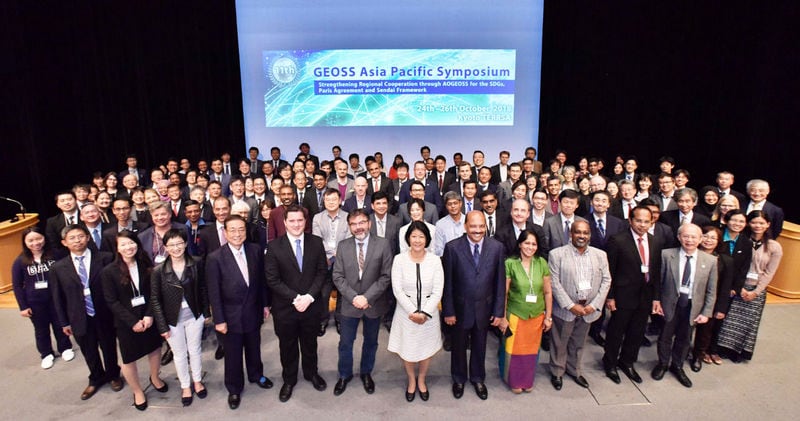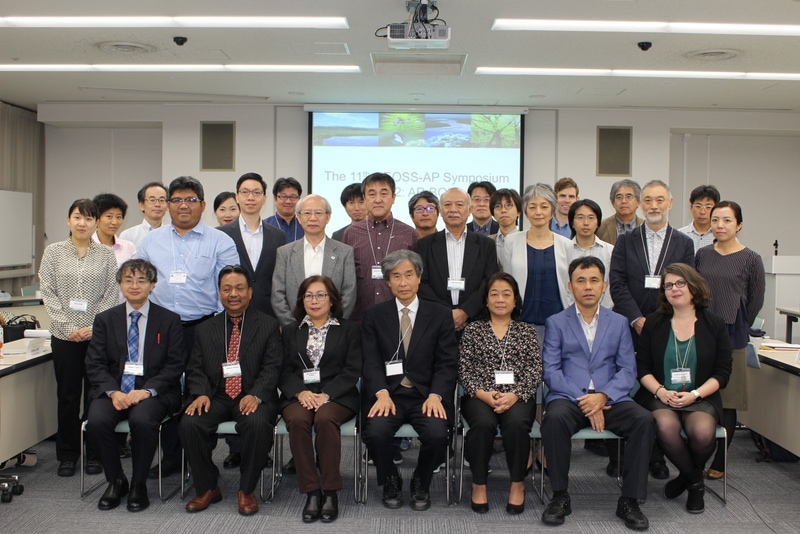163 representatives from across the Asia-Pacific region, including TERN Australia, have committed to an ambitious action statement on achieving the global targets set by the Sustainable Development Goals (SDGs), Paris Agreement and Sendai Framework. The ‘Kyoto Statement 2018’ was formalised during October’s GEOSS Asia Pacific Symposium, a key forum for strengthening regional cooperation.
The Global Earth Observation System of Systems (GEOSS) Asia-Pacific Symposium is the regional forum that brings together the Group on Earth Observatories (GEO) community in the Asia-Oceania region (Asia Oceania GEOSS) to exchange scientific and technical knowledge on Earth observations and their applications for regional and global priorities.
TERN, alongside Geoscience Australia and CSIRO, represented Australia at the 11th GEOSS Asia-Pacific Symposium, which was held in Kyoto from 24 to 26 October 2018 by GEO and Japan’s Ministry of Education, Culture, Sports, Science and Technology (MEXT).

The symposium and its six task groups play a significant role in strengthening regional cooperation for the SDGs, Paris Agreement and Sendai Framework.
Task groups, including the Asia-Pacific Biodiversity Observation Network (APBON), mapped regional earth observation and in-situ environmental monitoring systems activities against these three global agendas and identified domain-specific research strengths and knowledge gaps.
TERN, with already established SDG mapping activities, was able to contribute tangible examples from Australia’s ecosystem science research community, including the TERN Mangrove Observing System and TERN’s role in Australian carbon accounting and global satellite data calibration and validation.
The ‘Kyoto Statement 2018’ was prepared with input from all task groups and was presented to GEO country delegates at the GEO Week 2018 Asia Oceania Day. It states the agreed outcomes of the symposium and resolves member nations to take a set of actions before the 2019 symposium.
Exciting panel session on mapping #AOGEOSS activities against @GEOSEC2025 priorities #SDGs #ParisAgreement & #SendaiFramework. The Asia-Pacific region inc. Aust via @TERN_Aus @Geoscience @CSIRO #NCRIS, is making important contributions towards achieving these vital global targets pic.twitter.com/uRmbLeOEPx
— TERN (@TERN_Aus) October 26, 2018
Regionally-consistent common monitoring attributes and standard protocols
It is clear that there is a desire for countries in our region to align environmental measurements and research for regional and global synthesis. The participants in the APBON session also discussed harmonising observations across the region and domains, by referring to the concepts of Essential biodiversity variables (EBVs) and Essential Climate Variables (ECVs).
The APBON delegates, which included invited TERN speaker Mark Grant, considered it important that such measures are reporting directly to SDGs and targets under the Paris Agreement and Sendai Framework.
“A set of regionally-consistent common monitoring attributes and standard protocols for measuring them are pivotal in collaboratively tracking change in the state of our environment across the region and globe,” says Mark.
“TERN has a lot to offer the Asia Pacific region in the identification of essential measures and our published protocols for ecosystem monitoring and remote sensing calibration and validation can serve as a template for standardisation.”
TERN is currently consulting with the GEO Biodiversity Observation Network (GEOBON) and others about the possibility of establishing an ‘AusBON’ hub centered around TERN infrastructure.

Good examples presented at the GEO Week2018 in Kyoto, on where Australian ecosystem observing systems and earth observations such as from @TERN_Aus can contribute to growing Asia-Oceania ecosystem observation networks. https://t.co/enW4hfbnhp
— Alex Held (@AlexEarthObs) October 31, 2018






